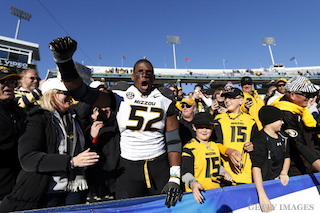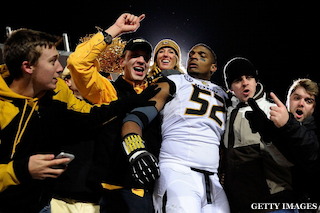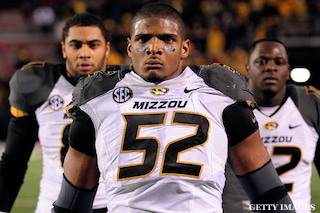
Even if you don't follow sports, you've probably read about Michael Sam. You've learned how his teammates and coaches at the University of Missouri embraced their star defensive end and protected his secret with tenacity. Your heart might have warmed that fans gave him a standing ovation when he attended at Mizzou basketball game a few nights ago, less than two weeks after Sam announced he is gay.
It was courageous, it was unprecedented, but one thing that nobody's brought up: What happened to Brendon Ayanbadejo's guys?
In April 2013 Ayanbadejo told the Baltimore Sun that as many as four players could conceivably come out simultaneously. Ayanbadejo, an ardent advocate for LGBT rights, followed up on this thought with an appearance on Anderson Cooper's CNN show.
It was big news. The public was intrigued and people were excited to know the trailblazers' identities. But in the end, no one came forward. The players kept to the shadows, and the story fizzled in a news cycle.
"I don't know why it didn't happen," Ayanbadejo says. "Athlete Ally, OutSports, some people in the NFLPA, were in contact with some anonymous gay players, and even I was contacted as well, anonymously, and it was an idea to get them to get together and potentially make a statement."

After Ayanbadejo's statements prompted a media circus, the athletes quietly, and understandably, retreated back into the world of secrecy that’s defined their entire existence.
The hope is, of course, that Michael Sam’s bravery inspires his peers. The reality? That probably won’t happen. Esera Tuaolo, who played nine years in the NFL and retired in 1999, came out in 2002 on HBO's Real Sports. Tuaolo has been in the locker rooms, at the parties, knows the culture, and represents a small fraternity of ex-athletes who have made the decision to come out.
"This is the thing with most of the athlete’s in the [closet]," Tuaolo says. “When you’ve been living with a crippling secret all of your life, and that’s all you protect, and that’s all you think about, somebody 'outing' you -- your life, everything changes. You become the secret."
Tuaolo, who now travels the world lecturing on homophobia in sports, admits that he'd probably still be in the closet had he not adopted kids with his partner. He'd become so accustomed to the "act" that the façade defined him more than the man he loved. It took adopting kids, the responsibility of helping mold another brain, teaching his children how to be their own person, for him to gather that strength.
And the road hasn’t been easy.

"It's just crazy that by telling the damn truth, you can lose it all," says Tuaolo, whose website is HateIsWrong.com. "For us, for the LGBT community, the hardest thing is having a relationship with your friends, your family, and just to know that you could lose them by telling the truth about yourself ... that’s hard on us."
He added, “To tell you the truth, the people that I didn’t think would support me, didn't. I’ve lost friendships, I’ve lost so much. Even family ... "
Ayanbadejo and former Vikings punter Chris Kluwe have gained attention during the past year for being straight guys who vocally support the LBGT community. Although the group he attempted to galvanize didn’t come out last year, Ayanbadejo's passionate in his belief that a group of gay NFL players wouldn't just help the sports world, but the planet as a whole.
"It's so much more impactful on society than it is on sport,” Ayanbadejo said. “You’re going to make football safer for 10, 20 guys, potentially, but you’re going to make a difference for [millions] of Americans and beyond in countries like Russia, or Senegal, or Nigeria, where LBGTQ brothers and sisters are being murdered or don’t even have rights at all. So here at home in the United States, you’re going to make such a huge difference, there might be a kid who’s contemplating suicide, or who doesn’t feel good about themselves, and they can go get a Michael Sam jersey, or they can go get a Player X, Y, Z jersey, and feel better about themselves because they want to be a professional athlete, and there’s a professional athlete out there who’s just like [them].”
While the world Ayanbadejo describes is certainly feasible, if there’s one thing that the Jonathan Martin-Richie Incognito debacle has elucidated, it’s the culture of an NFL locker room. If you’ve played sports, you probably weren't that surprised to hear the nature of the conversations that took place. The words used, the slurs hurled, dumb coaches participating, etc.
But can you imagine being a gay football player in that type of ignorant, backwards environment? Throughout the course of your career -- Pop Warner, high school, college, and now professionally, being called a "fag” if you can’t finish a workout? A “queer” if you can’t shed a block? A “fairy” if you sprain an ankle?

How does that affect your maturation? What kind of man do you become?
At what point do you throw down the barbell and scream out, "I’m gay!”
You don’t. Most likely, you come to hate that part of yourself, and you say nothing…
So to any gay athlete that’s battling with these complex demons, there’s something you need to know: Millions of people are ready to support you.
We know it's the locker room that makes coming out impossible. The downtime at practice, the restaurant after.
It’s easy to play the game. The game is your safe haven. But outside those three hours you spend on the field, your mind spins, and spins. You've thought about coming out so many times before, but never pulled the trigger. The lie is what you know, it’s a part of you. Embroidered in your soul.
You also know the circus that would come from your pronouncement, that things would never be anywhere close to the same.
All we can offer, as a society, is support. Just like the coaches, teammates, and fans at Mizzou gave to Michael Sam.

By "owning your story,” as Ayanbadejo puts it, you influence more than just football, baseball, basketball, hockey. You make the world a little less cold. You educate a new group of people on what being gay means.
It means absolutely nothing. Because the day is coming soon where a person's sexuality won’t be an issue. Michael Sam and whoever walks with him will take the abuse, the hate, deal with the cameras flashing, the reporters screaming, so the next generation can be judged by their character, not whom they love. You have the power to do that.
Yes, you.
And some fans will call you a queer, and loathe you, and never speak your name again. But most will still wear your jersey, and wear it proudly.
Because they respect courage, people who are true to themselves. They love you for who you are, and they know, in the end, you’ve changed the world.
-- Follow Tim Livingston on Twitter @timlikessports or email him timlivingston0sports@yahoo.com.




